True and Fascinating Canadian History
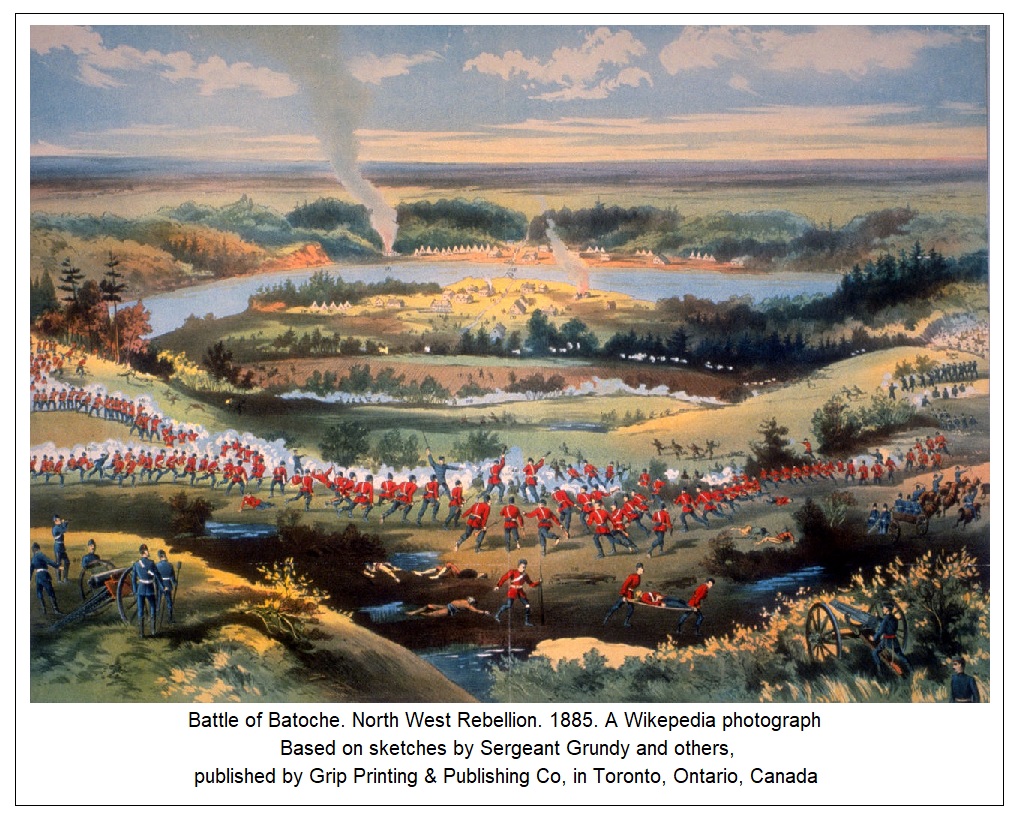
Vet of the Month: October, 2022
Reg#1426, Constable Arthur William 'Daddy' Oaks. WWI
by J. J. Healy,
RCMP Vets Ottawa, ON
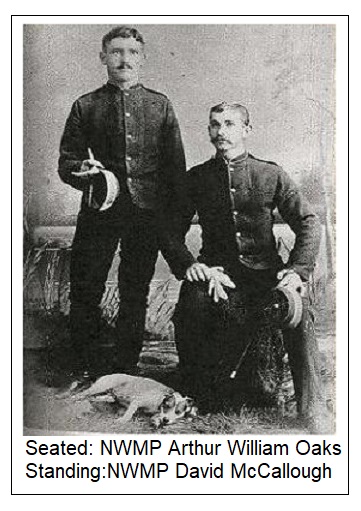
His real name was Arthur William Oaks Senior but for years and years he was known affectionately by his nickname 'Daddy' Oaks.
'Daddy' Oaks' life was interwoven with a variety of experiences; a lengthy stint in the NWMP, a business career, and a boom growth of Calgary in the 1880's -- the years were equally marked by the Indigenous people being pushed aside in the name of modernity. These were the days long before reconciliation. The Oaks family was tight knit, but 'Daddy' Oaks and his wife Elizabeth Mary also shared in family grief. Their oldest son Arthur William Jr. was killed in WWI. At the end of their lives, 'Daddy' Oaks and his wife died within two days of each other.
Arthur William 'Daddy' Oaks was born in 1865, and although the seeds of the North West Rebellion were planted in western Canada as early as the 1870's, it is very unlikely that 'Daddy' Oaks was thinking about strife and conflict when he joined the North West Mounted Police (NWMP) on June 6th, 1885. In those days, the pay was meagre, so it is very plausible that 'Daddy' Oaks was looking for a rugged, independent lifestyle, travel, new and exciting challenges, and high adventure. Those were the top priorities which attracted the majority of recruits to the NWMP in the early years. But, in the world of policing, trouble is one's close neighbour.
And so it was that 'Daddy' Oaks was called to do his duty in the North West Rebellion, during which he served faithfully in 1885. He survived the Rebellion without any noticeable or serious injuries, and for his devotion to duty he was awarded the North West Rebellion Medal of 1885. It was not the only time he would be called to war.
'Daddy' Oaks' obituary is found in the April, 1937 issue of The Quarterly. In 1887, he was transferred with the NWMP to Calgary, and their oldest son, Arthur Willam Jr. was born the same year. At the time, Calgary was expanding. Ranching was big business, new hotels were under construction, and the lumber and cattle industries were flourishing. To a large degree, prosperity depended on the railroad, and immigration into western Canada was encouraged and welcomed. It was an equally busy time for the NWMP. One can speculate that the duties of 'Daddy' Oaks and other NWMP consisted of long patrols on horseback, taking of the census, caring for animals, maintaining the peace, and frequent interactions with the Indigenous peoples who voiced their displeasure of being pushed aside. In his well researched book entitled, "The Riders of the Plains", author A. L. Haydon provides a realistic glimpse into the anxiety and restlessness of the Indigeneous people, and the growing uneasiness between the Indiginous people and new settlers who were arriving from the east by rail. Up until that time in history, the Indigenous people had never felt restricted by boundaries on the western frontier.
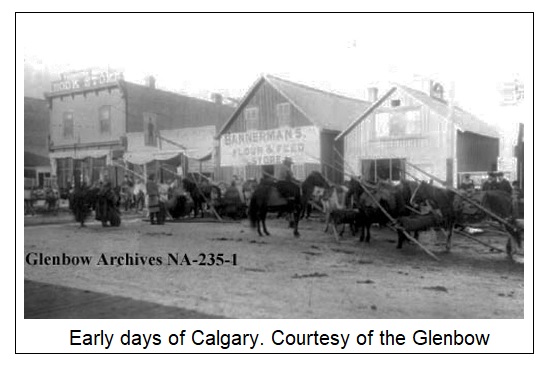
Author A. L. Haydon wrote, "In the old days, before their country had been invaded from the east, existence had been easy and pleasant. Buffalo-hunting, trapping, and trading with the Indians enabled them to live well and often luxuriously. Then with the disappearance of the buffalo they took to freighting and throve wonderfully well upon it. But this occupation was doomed as soon as the railway pushed itself across the plains." (Haydon: 155). The invasion of settlers by rail from the east was unsettling to the nomadic lifestyle of the Indigenous peoples, and it fell to the NWMP including men such as Constable 'Daddy' Oaks to keep the peace on the western plains as best they could. Today, one cannot help by look back to the unfolding of Canadian history, and wonder how the path of our Indigenous people would have evolved much differently in Canada, and for a more considerate, kinder and gentler way, if serious strains of reconciliation had been adopted as government policy in the 1870's and 1880's?
After about fourteen years of police service, 'Daddy' Oaks took his discharge from the NWMP in 1899. According to the ancestry website "Genie', he then worked for the railway police. According to ancestral accounts held by the Glenbow Museum, he was involved in a variety of business ventures in Calgary. In 1907, he joined Plunkett and Savage, a wholesale fruit company that operated in the tri-cities of Lethbridge, Calgary and Edmonton in the early 1900's. But, there were whispers of war in the distance.
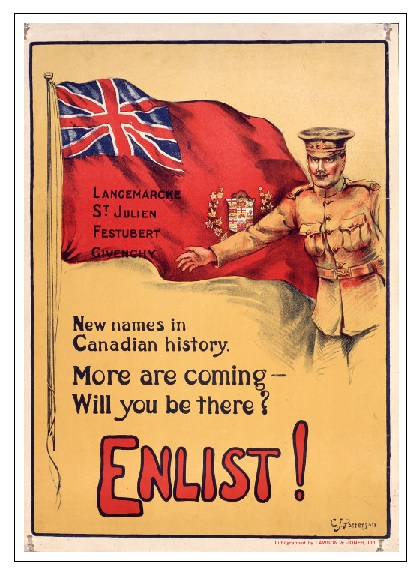
'Daddy' Oaks signed up for WWI in Calgary with the 56th Battalion. According to Wikepedia, the Battalion was authorized, recruited and was mobilized in 1914, and the Canadian Expeditionary Force (C.E.F.) embarked for Britain in 1916. Interestingly, two other soldiers in the Battalion included the future Mayor of Calgary, James Cameron Watson, and western Canada's oil executive Eric Harvic. 'Daddy' Oaks was attached to the Artillery Unit, and he served honourably. After the war, the 56th Battalion was awarded Battle Honours. It is only speculation, but the nickname 'Daddy' may have been given to Arthur William Oaks by his much younger WWI soldier chums since he would have been a father with some world experience when he signed up with the 56th Battalion sometime between 1914 and 1916.
Arthur and his wife, Mary Elizabeth had six children, but the family also shared in sorrow. One son, Arthur William Oaks Jr joined WWI as a private in the Canadian Infantry (Alberta Regiment). He was killed. Arthur Jr. was buried in the Faubourg-D'Amiens Cemetery in France. He was 21 years of age when he died.
Throughout the mid and later 1920's, 'Daddy' Oaks Sr. was active in the Royal Canadian Mounted Police (RCMP) Veterans Association, and in 1927, he was elected Vice President, a post which he held in Calgary for several years.
Mrs Mary Elizabeth Oaks died in Calgary, AB on February 5th, 1937, and 'Daddy' Oaks died two days later. He was 72. After a joint funeral service, 'Daddy' Oaks and Elizabeth Mary were buried side by side in Union Cemetery.
Reporting from Fort Healy,
J. J. Healy
October 7th, 2022
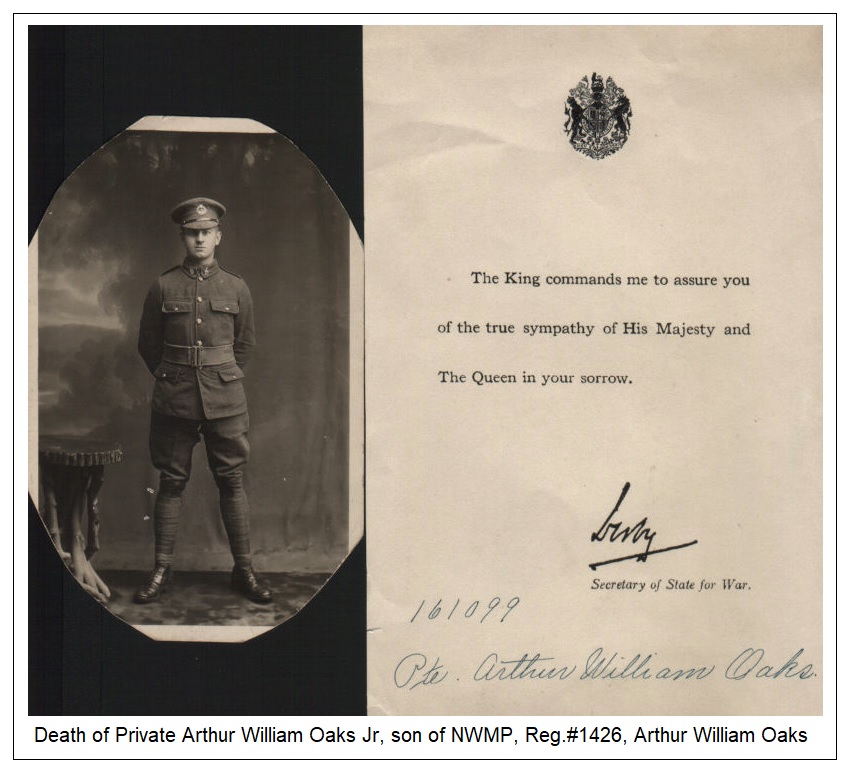
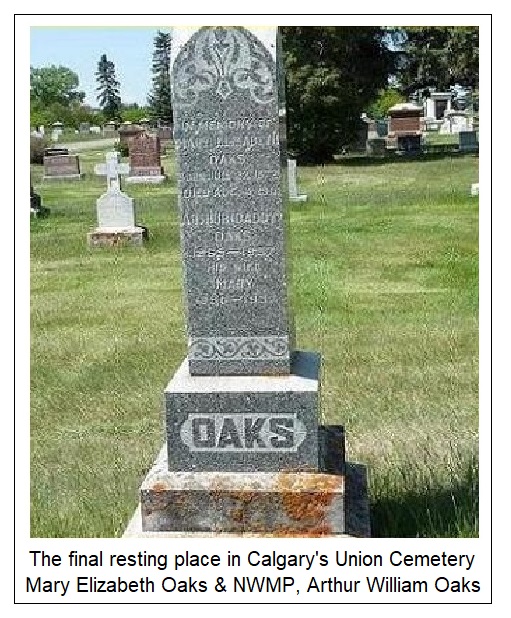
Haydon, A. L. (1971). The Riders of the Plains. Hurtig Publishing. Edmonton, AB.
Constable A. W. Oaks' obituary can be found in The Quarterly. April, 1937. p. 296
Wikipedia: https://en.wikipedia.org/wiki/56th_Battalion_(Calgary),_CEF





